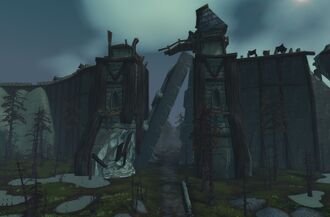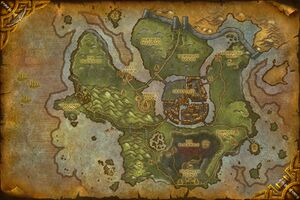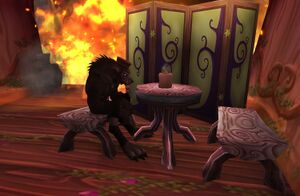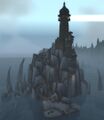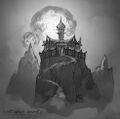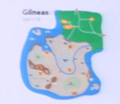Ruins of Gilneas
- This article is about the modern state of the peninsula. For the worgen starting zone, see Gilneas (starting zone). For the kingdom, see Gilneas (kingdom). For other uses, see Gilneas (disambiguation).
| Level: 5-30 (in-game: 1 - 20)[sic] | |
|---|---|
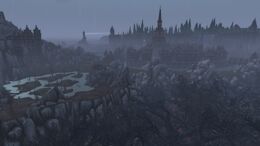 | |
| Capital(s) |
|
| Races |
|
| Formerly |
|
| Ruler(s) |
|
| Former ruler(s) |
|
| Major settlements |
|
| Minor settlements |
|
| Affiliation | Kingdom of Gilneas, Alliance |
| Former affiliation(s) | Scarlet Crusade, Blackhowl, 7th Legion, Forsaken, Horde, Servants of Koroth, Wolf Cult, Independent |
| Location | Southwestern Lordaeron |
| PvP status | Contested territory |
| Status | Active |
The Ruins of Gilneas is a peninsula southwest of Silverpine Forest on the continent of Lordaeron, and the heartland of the human kingdom of Gilneas, now under the rule of Queen Tess Greymane.
It is the name for the Gilneas zone after the events of the worgen starting experience, while Horde players are sent here during the Silverpine Forest storyline. Since the ![]() [Reclamation of Gilneas] storyline, players who head to this area (either before or after completing it) will find various zones inhabited by the Gilnean people. Unlike most other zones, there are no quests to be done here outside of the storyline.
[Reclamation of Gilneas] storyline, players who head to this area (either before or after completing it) will find various zones inhabited by the Gilnean people. Unlike most other zones, there are no quests to be done here outside of the storyline.
Following the Cataclysm and the invasion of Gilneas, the peninsula was abandoned.[1][2] At some point prior to the Fourth War, the Forsaken took control of the peninsula once again,[3] and the Gilneans were shown to be mobilizing around the realm during the conflict. It was later stated that Forsaken troops still occupied Gilnean lands years after the war ended,[4] until the Desolate Council withdrew them, leaving an opportunity for the Scarlet Crusade to take over Gilneas City. They were later defeated through a joint Alliance-Forsaken effort, finally returning the land to the kingdom of Gilneas over a decade after their exile.
History
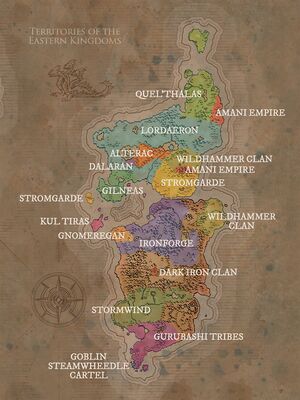
War of the Satyr
Belysra Starbreeze claims that a group of night elves formerly known as Druids of the Pack lived in the vicinity of Tal'doren in ancient Gilneas.[5]
Arathor Empire
2,700 years BDP, following their victory in their war against the trolls, the humans of the Arathorian Empire expanded the kingdom in size and power. After the death of King Thoradin the empire began to expand, founding new city-states in the wilderness - including Gilneas. Those who had settled in the coastal region of Gilneas constructed a series of robust harbors. The boldest of the sailors eventually discovered a large island to the south that was rich with metal ores and other valuable natural resources. Some of them later stayed on this island and founded a mighty maritime outpost named Kul Tiras.[6]
Second War
During the Second War, King Genn Greymane was not a strong supporter of the Alliance of Lordaeron, believing that his own armies would be more than enough to deal with any threat.[7] Nevertheless, the king argued that he should assume the role of Supreme Commander of the Alliance since Gilneas was the most southern of the kingdoms and that meant it would be first overrun if the Horde wasn't repelled.[8] He also insisted several times during the meetings that the Alliance forces should be stationed all around Gilneas’s borders in case the orcs somehow appeared there first.[9] During the war, Greymane held back his armies until the enemy finally attacked his own borders,[10] and was then said to have partaken in combat versus the orcs.[11]
In the aftermath, Turalyon spearheaded the efforts to rebuild the Eastern Kingdoms by gathering the rulers of each kingdom, who agreed to pool their resources to mend their war-ravaged nations.[12] Meanwhile, in a discussion with Lord Vincent Godfrey, King Greymane questioned the wisdom of listening to the advice of Crowley and Godfrey in joining the Alliance, stating that it had gotten them nothing but dead Gilneans. Greymane stated his plans to withdraw from the Alliance and wall off Gilneas from the rest of the world. Upon looking at the map of Gilneas, the King's decision to close Gilneas's borders and construct the great wall would cut through the lands of Lord Darius Crowley, as the noble's lands had the mountains as a natural barrier the wall could be built into. Should the wall be finished, it would separate the towns of Pyrewood Village and Ambermill from the rest of Gilneas. Greymane agreed and was confident that Crowley would understand his reasoning.[13] Since Gilneas was self-sufficient, and needed little in the way of food or resources from the rest of the Alliance, it was clear that Greymane had no interest in aiding the other nations.[14]
The Greymane Wall
Years later, while the Alliance of Lordaeron was unaware of the death cults forming in their lands before, the departure of Quel'Thalas who stated that the humans' poor leadership had led to the burning of their forests during the Second War,[15] alongside the liberation of the orcs from internment camps by Thrall, led to the departure of Gilneas from the Alliance. Consequently, King Greymane started the construction of the Greymane Wall, attempting to forever remove his nation from what he considered "other people's troubles". The construction was completed prior to the Third War.[16] At the time of the Scourging of Lordaeron, King Greymane barricaded the majority of Gilneas behind the Wall and closed off the nation from the rest of the world. Gilneas was shielded from the rest of the world by land, but also by its high cliffs and treacherous reefs by sea.[17] As the Undead Scourge had devastated Gilneas' neighbors and not long after were outside the Wall, no one, not even human refugees were allowed to enter the realm, King Greymane even refused to help Lordaeron, who weeks before had begged Gilneas for help. The king saw the fall of Lordaeron as confirmation that he had made the right choice in isolating his kingdom from the world.[18] The lands of Lord Crowley including Pyrewood Village and Ambermill were notably separated from their liege and nation by the wall.[13]
At the peak of their strength, the Scourge relentlessly assaulted the Greymane Wall and threatened to devour all Gilneas. Their number was small at first, but it increased over time and they did not flag. King Greymane's armies held the wall for days against a massive sea of undead hordes, but for every undead that fell, another took its place.[13] In a desperate attempt to repel the undead, Greymane ordered Archmage Arugal to unleash the worgen contained for millennia in the Emerald Dream. At first, everything went according to plan, unfortunately, after the Scourge were driven off, the worgen turned on the Gilnean soldiers and infected them with their curse,[19] and began attacking other humans living in Silverpine Forest. Consequently, King Greymane ordered the return of his troops as well as the permanent closure of the Greymane Wall's doors, however, as some retreating soldiers were infected, they began secretly to spread the worgen curse. Over the years, reports of strange attacks and disappearances rose, fear took root in the hearts of Greymane's people, while the curse continued to spread in the kingdom through the Wolf Cult, gradually eating away at Gilneas' humanity.[20]
King Greymane also forbade any attempt to leave the self-isolated realm, and all ports were closed, leaving sailors and people of other nations stranded in Gilneas, such as the Brashtide Crew.[21][22]
Cataclysm
- Main article: Invasion of Gilneas
Before the Cataclysm, the Forsaken started battering at the nation's gates in a bid to conquer Gilneas. Under orders from Garrosh Hellscream, now Warchief of the Horde, Sylvanas Windrunner was commanded to conquer the lands of Gilneas to secure resources[23] and its safe ports. At the same time, Sylvanas had her own objective – the retrieval of the Scythe of Elune, an artifact capable of summoning complacent worgen that could spread their curse to all humanity.[24]
Several days prior to the attack by the Wolfcult on Gilneas City, King Genn ordered Prince Liam to increase the presence of the military across Gilneas, concerned with the growing number of attacks across the kingdom, of which included the Starlight Slasher murders. When questioned on whether these troops should be moved from the wall, Genn refused to allow it as the Forsaken would use any opportunity to exploit a weakness on the wall. Not wanting to alarm the civilians with the sudden upsurge of military forces, he instructed to state that the Northgate rebels were acting up again.[25]
When the Cataclysm happened, it destroyed some of the jagged reefs that protected Gilneas from the sea and breached the famed Greymane Wall itself, allowing the Forsaken to pour into Gilneas by land from Silverpine as well as land at Duskmist Shore.[26][17] As the Forsaken invasion progressed, the whole south-west of Gilneas began collapsing into the sea, destroying Duskhaven.[27] Following the Battle for Gilneas City, as the survivors arrived at Keel Harbor,[28] a fleet of night elven ships appeared on the coast of Gilneas. Once again the strangers from across the sea had come to help Genn Greymane and his people.[29] As promised by Belysra Starbreeze, the night elves brought ships as well as an offer of sanctuary in their lands. While a large amount of soldiers and volunteers remained to form the Gilneas Liberation Front under the leadership of Darius Crowley, Admiral Nightwind took the survivors to safety at Rut'theran Village in Darnassus.[30]
Post invasion
Following the events of the invasion of Gilneas, the Gilneas Liberation Front remained to continue fighting for the freedom of their homeland. This region quickly became one of the main fronts in the war between the Alliance and the Horde following the Cataclysm.[31] Alongside their new 7th Legion allies, the Gilnean forces clashed with the Forsaken armies marching beyond the ruined Greymane Wall. Through several battles, which ended in the loss of all the Forsaken bases aside from the Forsaken Front, the Liberation Front ended up cutting off most of the Forsaken's support and eventually removed the Forsaken from the area completely. This was achieved through the aid from their new allies in the Bloodfang pack, and 7th legion support in the form of naval soldiers and submarines (which proceeded to destroy the entire Forsaken fleet in the region).[32] The loss of the Forsaken Fleet was enough to turn the tide completely, forcing the Horde from the tattered kingdom entirely, though a small contingent was able to secure the body of Gilnean insurgent and former lord Vincent Godfrey, as well as his henchmen.[33][34]
Following the Forsaken defeat in Gilneas, Darius Crowley and the Gilneas Liberation Front, led the final assault on Silverpine Forest, attempting to retake part of the land. However, Sylvanas, with Godfrey's aid, captured Lorna Crowley and used her as a bargaining chip.[35] With no other option, Crowley ordered the retreat from Silverpine in order to save Lorna from the undead, an act that angered Ivar Bloodfang greatly. Despite this loss, however, the timely betrayal of Sylvanas by Godfrey ended up saving the Alliance from losing their grip on Gilneas, an unintended effect on Godfrey's behalf as he did not wish to save the Alliance (especially the Gilneans who made up most of the forces). After being resurrected by her Val'kyr, Sylvanas was too weakened to continue the assault, ending the Horde's assault at the border of Silverpine, leaving Gilneas in Alliance hands and allowing their forces to retreat beyond the wall.[36][37]
Aftermath
In the aftermath of Silverpine, the Alliance had cemented their hold in Gilneas for a time. This allowed the Bloodfang to branch out into Hillsbrad Foothills to continue the fight against the Forsaken. With all Forsaken land bases either destroyed or recaptured by Alliance forces, the Forsaken began to launch naval assaults on the area, starting an ongoing battle over the coastal region as the Alliance worked to repel the Forsaken's attempts to re-establish a land base within the peninsula.
Aside from the battles on the coast, the situation within the peninsula was relatively silent until the demise of Deathwing. Going by the name of the Blackhowl, the group of Gilnean humans and worgen occupied Gilneas city under the lead of Lord Hiram Creed. It was later revealed by the Assassin's League that Creed was a member of the black dragonflight,[38] who used his blood to corrupt the Gilneans in secret, attempting to make them his pawns and an army of draconically enhanced servants. However, his schemes were ended by an assassin working for Wrathion in his crusade to kill every last black dragon on Azeroth,[39] freeing the Gilneans of the dragon's influence.[40]
At some point after the death of Creed, both factions withdrew from Gilneas' mainland for unknown reasons,[2] leaving the only area of activity in the zone along the coastline where skirmishes were fought.
Mists of Pandaria
After the defeat of Garrosh Hellscream in the Siege of Orgrimmar, High King Varian Wrynn said that the Alliance would cleanse Gilneas from the plague and keep Sylvanas Windrunner at bay.[41]
Before the Storm
By the time of the end of the Argus Campaign, Gilneas was referred to as fallen, with nothing but "wind, sorrow and ruin" in the land.[42] When King Genn Greymane arrived at Stromgarde Keep before the events of the Gathering, he told High King Anduin Wrynn that both kingdoms were now in ruins, with Gilneas being home to the Forsaken and Stromgarde being overrun with criminals, ogres, and trolls.[43]
War of the Thorns
During the War of the Thorns, Sylvanas Windrunner hoped to use the ruined status of Gilneas as an inciter among the Alliance after Teldrassil was captured. She erroneously attributed Greymane's desire to reclaim his kingdom to cloud his judgment, causing a division within the Alliance between supporters who wished to reclaim Teldrassil and those who wished to reclaim Gilneas. Unbeknownst to Sylvanas, Greymane immediately claimed that Teldrassil would need to be reclaimed first, with Gilneas coming after, as a gesture to repay the debt owed to the night elves by the Gilnean people.[44][45]
Battle for Azeroth
At the time of the Fourth War, Gilneas was a point of interest for the Alliance and Horde forces in Lordaeron following the Battle for Lordaeron. The 7th Legion surrounded Shadowfang Keep, led by Captain Tobias Zaren, to prevent Chief Plaguebringer Harris from unleashing a new bio-weapon against Gilneas.[46] At the same time, a Gilnean army marched under Darius Crowley to assault the Horde-controlled area of the Sludge Fields, which was amassing undead to assail Gilneas.[47][48]
The Horde also moved on the Arathi Highlands in an attempt to destroy the restored Stromgarde Keep, in order to prevent the Alliance's full control over the Eastern Kingdoms and to use Stromgarde as a staging point for attacking Gilneas.[49]
Shadowlands
After the creation of a new Desolate Council, the newly appointed Calia Menethil sent a letter to King Genn Greymane, explaining that one of her first proposals would be withdrawing the Forsaken troops from Gilneas.[50]
Dragonflight
Following their defeat against the Forsaken in Silverpine Forest, the Scarlet Crusade managed to weasel their way into the peninsula and occupy the capital of Gilneas City, using it as their headquarters for their operations. Led by Inquisitor Fairbell, they made their headquarters within Light's Dawn Cathedral and filled the capital with their most experienced forces.[51]
Shortly after the night elves moved to Amirdrassil on the Dragon Isles, King Genn Gretmane declared that the time had come to reclaim Gilneas, and organized an alliance offensive with Queen Mia Greymane and Princess Tess Greymane, aided by the 7th Legion and elements of the Alliance under the command of Highlord Leoric Von Zeldig. Upon arriving in Gilneas, King Genn was shocked to find the Forsaken present, invited by Tess and led by Calia Menethil and Lilian Voss of the Desolate Council. Despite his apprehension, Genn was willing to trust Tess' initiative, though he could not bring himself to personally lead the Reclamation of Gilneas alongside the Forsaken due to their murder of Liam Greymane.[52]
Following the death of Inquisitor Fairbell and the defeat of the Scarlet Crusade,[53] Calia and Lillian led the Horde out of Gilneas at last. Meanwhile, with Gilneas at last secure, King Genn re-affirmed his faith in his daughter and abdicated, declaring that Tess would henceforth reign as the new queen of Gilneas, ready to lead their people towards a better future.[54]
Geography
Gilneas is a large peninsula located on the southwest of the continent of Lordaeron. It lies south of Silverpine Forest and southwest of Hillsbrad Foothills, with Baradin Bay to its south and east, and Tol Barad to the west across the Great Sea. Storms from over the Great Sea are common, and the sun rarely shines.[55] Gilneas was shielded from the rest of the world by its high cliffs and treacherous reefs by sea,[56] to the point that the kingdom had no less than three lighthouses. During the Cataclysm, the southwestern part of the peninsula, which included the town of Duskhaven, was destroyed by an earthquake sinking the land into the sea. Some of the jagged reefs were also destroyed by the Cataclysm, paving the way for a naval invasion of the kingdom.
Maps and subregions
Adjacent regions
| Zone Name | Faction | Level Range | Direction | Access |
|---|---|---|---|---|
| Silverpine Forest | 10 - 60 | North | By foot, or by flying methods. | |
| Hillsbrad Foothills | 15 - 60 | Northeast | By swimming or flying to Purgation Isle. |
Battlegrounds
Notable characters
- Main article: Ruins of Gilneas NPCs
Quests
- Main article: Silverpine Forest storyline
Resources
Battle pets
![]() Please add any available information to this section.
Please add any available information to this section.
Wild creatures
Inconsistencies through expansions
Since its fall, Gilneas' status was wildly speculative for years. This was due to the inconsistency and lack of explanation of various elements concerning the region.
- In Cataclysm, following the worgen starter zone, Gilneas was contested between the Alliance, Gilneas and the 7th Legion, and the Horde, the Forsaken and their orcish reinforcements. This was the case until near the end of the Silverpine Forest questing experience, where Gilneas was left in Darius Crowley and Ivar Bloodfang's hands as they retreated from Silverpine.[57] Their forces were next seen in Hillsbrad Foothills, where Bloodfang seemed to be organizing with the Stormpike clan on Purgation Isle, an island easily accessible from Gilneas. This seems to corroborate with the Battle for Gilneas battleground, which depicted the Forsaken attempting to make another landholding within Gilneas, whilst the Alliance started on the mainland from the Gilnean Stronghold.
- To further complicate matters, the Blackhowl, a group of Gilneans being secretly led by a black dragon known as Hiram Creed, occupied Gilneas City with little concern. It is unknown if the Blackhowl had ever left the Alliance, as the Gilneans were said to not know their leader was actually a black drakonid in disguise.
- In Mists of Pandaria, after the defeat of Garrosh Hellscream, High King Varian Wrynn said that the Alliance would cleanse Gilneas from the plague and keep Sylvanas Windrunner at bay.[58] This is the first mention of the peninsula being heavily blighted, as while the Blight was used against them, all areas that were seen severely blighted in both the starting zone and during the Silverpine experience were also seen readily occupied by Alliance forces. Most noteworthy is Gilneas City, which was blight bombed heavily during the worgen starting experience, but was later occupied by both the 7th Legion and the Blackhowl with little issue, thus raising the first inconsistency with Gilneas' status. During this time, Loreology and the Ultimate Visual Guides clarified on Twitter that Gilneas had been abandoned by both factions and the city was in ruins. This is not given any explanation, as when the area was last seen, the Alliance held it. This also raised the question of whether the Battle for Gilneas battleground was still ongoing or not.
- Though Gilneas goes unmentioned in Warlords of Draenor and Legion, the leadership of the Gilneas Liberation Front was entirely seen in the Gilneas Brigade. As the force was dedicated to the reclamation of Gilneas, it is never specified what caused their departure to be warranted. Dave Kosak once more referred to the Blight as having plagued the entire zone, despite it having only been weaponized in the northern areas of Gilneas and never having made it to the southern areas as the Forsaken ships there were destroyed by the Cataclysm. Kosak stated that there were "pockets of safety for careful travelers" when speaking on the level of blighting that affects Gilneas. It is unknown whether this means that the Blight had not reached certain areas of the peninsula, if there were forces in the area keeping it at bay, or what regions were unblighted.[59]
- Gilneas was later mentioned in the book Before the Storm, in which it was inconsistently referred to as being "home to the Forsaken" by Genn, while also being claimed to be entirely empty and abandoned. Once more, it was referred to as plagued, which was inconsistent with the idea that it is home to the Forsaken, as the undead were still susceptible to the New Blight. Its status as being un-reclaimed was re-affirmed within Elegy and A Good War, where Gilneas was mentioned as still having not been reclaimed or restored, and Sylvanas Windrunner was relying on Genn to push for Gilneas over Teldrassil to be reclaimed as the former was lost first. This did not explain whether or not the region was abandoned or occupied by the Forsaken.
- In Battle for Azeroth, Gilneas was once more inconsistently referred to. By the beginning of the expansion, it was referred to by Displaced Gilnean Refugees as something the Alliance should have been focusing on, over the Ruins of Lordaeron.[60] The Battle for Azeroth Features Trailer visibly showed the Alliance militarily spreading its influence over most of the Eastern Kingdoms, including over the Gilnean peninsula.[61] The mission table quests later in the expansion referred to several Gilnean leaders in the north attacking the Forsaken, with the Bloodfang Pack claiming Fenris Isle and Darius Crowley invading the Sludge Fields within Hillsbrad as well as the Forsaken occupying Shadowfang Keep. There, it was stated that the Forsaken were readying a blight to be used against Gilneas, inferring that the region was once again in the kingdom's hands. In addition, the Q&A section for the Warfront panel at BlizzCon 2018 stated that Stromgarde's warfront was a necessity to the Horde so they could use it as a launching point to invade Gilneas. This suggested the Alliance held Gilneas, but didn't explain how the Forsaken lost control of Gilneas if they ever had it to begin with, the status of the Blight, nor what the state of potential Alliance occupation was.
- In addition, during their confrontation, King Rastakhan mockingly called Genn "an exile without a homeland", implying that during the Fourth War, Gilneas was still largely unreclaimed, or at least unsettled, perhaps due to Genn diverting the bulk of his kingdom's forces to aid their kaldorei allies in the Battle for Darkshore, something he vowed to Anduin that he would do were he forced to choose between his kingdom and the night elves.[62]
- In Shadowlands, Gilneas' status was once again referred to at the end of the
 [Return to Lordaeron] questline. After the creation of a new Desolate Council, the newly appointed Calia Menethil sent a letter to Genn Greymane explaining that one of her first proposals would be withdrawing the Forsaken troops from Gilneas.[63] This is the first time Forsaken troops are mentioned being present in Gilneas since the supposed withdrawal of all factions from the territory. This does not elaborate if the Forsaken occupied all of Gilneas, or simply had troops there that would be withdrawing. During the turn in dialogue of
[Return to Lordaeron] questline. After the creation of a new Desolate Council, the newly appointed Calia Menethil sent a letter to Genn Greymane explaining that one of her first proposals would be withdrawing the Forsaken troops from Gilneas.[63] This is the first time Forsaken troops are mentioned being present in Gilneas since the supposed withdrawal of all factions from the territory. This does not elaborate if the Forsaken occupied all of Gilneas, or simply had troops there that would be withdrawing. During the turn in dialogue of  [60] Report to Greymane, Genn phrases the 'return of Gilneas, though this does not elaborate if they are "returning" Gilneas or if they would not stop the 'return of' the Gilnean people to their homeland. Calia referred to the idea as the withdrawal from Gilnean lands, thus leaving the actual level of occupation or what parts of Gilneas the Forsaken were in completely speculatory.
[60] Report to Greymane, Genn phrases the 'return of Gilneas, though this does not elaborate if they are "returning" Gilneas or if they would not stop the 'return of' the Gilnean people to their homeland. Calia referred to the idea as the withdrawal from Gilnean lands, thus leaving the actual level of occupation or what parts of Gilneas the Forsaken were in completely speculatory.
- The matter was finally settled in Dragonflight, where Gilneas was reclaimed by the Gilneans from the Scarlet Crusade. While it was not explained how the Crusaders managed to claim swaths of the peninsula, they did commandeer Gilneas City in its entirety. After being defeated by a joint Alliance-Horde effort, headed by the Forsaken and Gilneas, the kingdom was at last restored to the hands of its rightful owners, the Gilnean people. The matter of the blight was never brought up, though given that Gilneas seems to be occupied without issue across the kingdom, it appears to have dissipated.
In the RPG
Gilneas is a large peninsula that juts into the sea south of western Lordaeron. Silverpine Forest lies to the northeast, Kul Tiras awaits across the sea to the south, and Zul'Dare is found to the southeast. Gilneas is a cold, rainy place, mainly because the ocean surrounds the peninsula on three sides, making sea storms common. High cliffs on the shores protect the peninsula from sailors' curious eyes. Greymane Wall is the only evident site in the region.[64][65]
Gilneas does not allow anyone in or out, and none knows what has been transpiring there for the past ten years. Brann Bronzebeard once questioned everyone he came across, mainly refugees, but none could offer him anything more than curses and dark looks toward Gilneas.[64]
History
Lord Genn Greymane, a brawny warrior who must be in his seventies, has ruled Gilneas for decades. He offered only token support to the Alliance of Lordaeron during the Second War. He never supported the Alliance and argued against its existence from beginning to end. Thus, after the war, he and his people constructed the Greymane Wall: a massive barrier spanning the entire northern border, and no one has heard anything from Gilneas since.[64][65][66][67]
During the Third War, refugees from the north camped at Greymane Wall, pleading to be let inside. The gates remained closed, and undead patrols slaughtered the refugees.
Though nothing hostile has come out of the peninsula, some cannot resist the allure of mystery, as perhaps something dire has befallen Gilneas. Rumors of what was transpiring there became the subject of rumors throughout the Alliance - the renowned explorer Brann Bronzebeard theorized that the nation had fallen to the naga as one such example.
Ironforge dwarves, seeking allies to help drive the Scourge from Lordaeron, intended to send a diplomatic party to Gilneas. King Magni hired goblin zeppelins to ferry the diplomats and summoned Wildhammer gryphon riders as escorts. Yet, as no one knew what to expect in Gilneas, Magni hired a few trusted mercenaries to accompany his ambassadors.[65]
Notes and trivia
- Belysra Starbreeze claim the Druids of the Scythe called Tal'doren home in ancient Gilneas, however, this is incompatible with the rest of current lore (see Tal'doren#Discrepancies).
- Prior to the Reclamation of Gilneas in Dragonflight, the area had very few ruins (except the wall), although it was described as ruins. The city, while not pristine, was intact, and all major towns were untouched structurally beside Duskhaven.
- The geography of the Ruins of Gilneas zone was identical to the instanced Gilneas after the flooding of Duskhaven. However, aside from phasing on a few quests, it was completely devoid of NPCs or mobs. The only mobs in the zone were some critters and beasts (including the uniquely colored Highlands Foxes, which are, oddly, absent in the instanced Gilneas zone).
- There were no mailboxes, even the ones that were interactable in the starting Gilneas zone were not clickable here. There were also no flight paths (except for one Horde flight path temporarily available in the Silverpine Forest questline); the only way in was by foot, swimming, or flying mount. As such, reaching the Ruins of Gilneas was significantly easier for Horde players than Alliance players, whose nearest flight path was the far away Aerie Peak, while the Horde had flight paths in nearby Silverpine Forest and Hillsbrad Foothills. The fastest route for Alliance players was probably by flying mount from the northern coast of Dun Morogh or from Menethil Harbor; in both cases, the travel distance was just short enough to avoid fully depleting the fatigue bar with a 280% flying mount if flying in a straight line.
- On roleplaying realms, this zone is often repurposed as a roleplaying hub for Gilnean characters. The nearby Shadowfang Keep Meeting Stone can be used by both Alliance and Horde players as the fastest way of getting into the Ruins of Gilneas.
- After patch 3.1.0, the loading screen/ship route from Menethil Harbor to Theramore Isle no longer crossed Gilneas.
- At the launch of Battle for Azeroth, the zone was glitched and its zone map could not be uncovered. This was fixed with 8.1, though the map does not function the same way it used to.
- Previously, certain parts of the map would display subzone names when moving the pointer over the map. Now it only shows "Ruins of Gilneas", "Ruins of Gilneas City", and strangely "Emberstone Mine" which occupies much of the eastern portion of the map.
- Gilneas City could be clicked from the world map as one could with a faction city. This is no longer possible.
Gallery
Gilneas' landscape before the Third War in Curse of the Worgen.
Duskhaven submerged by the Cataclysm.
The Greymane Wall before its destruction.
The Battle for Gilneas loading screen artwork.
- In-game maps
2.4.0 map.
- Other maps
The peninsula in the wake of the Third War as seen in Chronicle 3.
The shattered peninsula after the Cataclysm in Chronicle 3.
Gilneas in the World of Warcraft: Game Manual.
The peninsula in Warcraft II.
The peninsula in Warcraft III.
Gilneas concept art from The Art of World of Warcraft: Cataclysm.
Initial concept layout. (seen at BlizzCon 2009).
The peninsula can barely be seen in a Warcraft film universe map.
Patch changes
 Patch 10.2.5 (2024-01-16): Updated. The Northern Headlands have been cleared of most Forsaken objects, and the ruined buildings no longer burn. Gilneas City has been cleared of tents, debris, and barricades in some areas, and has been filled with human and worgen NPCs. Stormglen Village has been given a small docking area to its south.
Patch 10.2.5 (2024-01-16): Updated. The Northern Headlands have been cleared of most Forsaken objects, and the ruined buildings no longer burn. Gilneas City has been cleared of tents, debris, and barricades in some areas, and has been filled with human and worgen NPCs. Stormglen Village has been given a small docking area to its south.  Patch 8.3.0 (2020-01-14): Gilneas Gryphons, Gryphon Hatchlings, and Mistfang Alpha added just east of Emberstone Village.
Patch 8.3.0 (2020-01-14): Gilneas Gryphons, Gryphon Hatchlings, and Mistfang Alpha added just east of Emberstone Village.  Patch 7.3.5 (2018-01-16): Level scaling implemented, previous zone level: 14 - 20.
Patch 7.3.5 (2018-01-16): Level scaling implemented, previous zone level: 14 - 20.  Patch 4.0.3a (2010-11-23): Added.
Patch 4.0.3a (2010-11-23): Added.
See also
References
- ^ Ultimate Visual Guide
- ^ a b Loreology on Twitter (archived)
- ^ Before the Storm, chapter 28
- ^
 [Letter to Greymane]
[Letter to Greymane]
- ^


 [1-30] Tal'doren, the Wild Home
[1-30] Tal'doren, the Wild Home
- ^ World of Warcraft: Chronicle Volume 1, pg. 133
- ^ Warcraft II: Tides of Darkness manual, Nations of the Alliance, Gilneas
- ^ Tides of Darkness, chapter 5
- ^ Tides of Darkness, chapter 9
- ^ Day of the Dragon, chapter 1
- ^ Wolfheart, chapter 10
- ^ World of Warcraft: Chronicle Volume 2, pg. 176
- ^ a b c Lord of His Pack
- ^ World of Warcraft: Chronicle Volume 3, pg. 36
- ^ The Alliance Splinters
- ^ World of Warcraft: Chronicle Volume 3, pg. 34 - 36
- ^ a b


 [1-30] Kill or Be Killed
[1-30] Kill or Be Killed
- ^ World of Warcraft: Chronicle Volume 3, pg. 60
- ^ Curse of the Worgen Issue 5, pg. 29
- ^ Curse of the Worgen Issue 5
- ^
 [10-30] An Old Sea Dog
[10-30] An Old Sea Dog
- ^ Quote by Enormous Shawn Stooker: "We used to roam the seas... 'til that damned King Greymane shut down the harbors in Gilneas! If it weren't for him, we wouldn't be..."
- ^ Battle for Gilneas battleground description
- ^


 [1-30] At Our Doorstep
[1-30] At Our Doorstep
- ^ Curse of the Worgen Issue 2
- ^


 [1-30] Invasion
[1-30] Invasion
- ^


 [1-30] Alas, Gilneas!
[1-30] Alas, Gilneas!
- ^


 [1-30] Keel Harbor
[1-30] Keel Harbor
- ^ World of Warcraft: Chronicle Volume 3, pg. 201
- ^


 [1-30] Rut'theran Village
[1-30] Rut'theran Village
- ^
 [5-30] The Gilneas Liberation Front
[5-30] The Gilneas Liberation Front
- ^
 [Orders from High Command], from
[Orders from High Command], from  [5-30] On Whose Orders?
[5-30] On Whose Orders?
- ^
 [5-30] A Man Named Godfrey
[5-30] A Man Named Godfrey
- ^
 [5-30] Rise, Godfrey
[5-30] Rise, Godfrey
- ^
 [5-30] On Her Majesty's Secret Service
[5-30] On Her Majesty's Secret Service
- ^
 [5-30] Cities in Dust
[5-30] Cities in Dust
- ^ Ultimate Visual Guide, pg. 104-105
- ^

 [35] To Catch a Thief
[35] To Catch a Thief
- ^

 [35] Our Man in Gilneas
[35] Our Man in Gilneas
- ^

 [35] Assassinate Creed
[35] Assassinate Creed
- ^ Garrosh Hellscream (tactics)#Alliance
- ^ Before the Storm, chapter 1 & 4
- ^ Before the Storm, chapter 28
- ^ Elegy, pg. 51-52
- ^ A Good War, pg. 13-14
- ^
 Shadowfang Plague
Shadowfang Plague
- ^
 Undead Rising
Undead Rising
- ^
 Gilnean Assault
Gilnean Assault
- ^ Blizzcon 2017, Warfront: Stromgarde
- ^
 [Letter to Greymane]
[Letter to Greymane]
- ^
 [70] Scarlet Blood
[70] Scarlet Blood
- ^
 [70] To Gilneas
[70] To Gilneas
- ^
 [70] Righteous Fire, Righteous Fury
[70] Righteous Fire, Righteous Fury
- ^
 [70] Beginning a New Dawn
[70] Beginning a New Dawn
- ^ Ultimate Visual Guide, pg. 106
- ^


 [1-30] Kill or Be Killed
[1-30] Kill or Be Killed
- ^ Ultimate Visual Guide, pg. 105
- ^ Garrosh Hellscream (tactics)#Alliance
- ^ Dave Kosak on Twitter: "Much of the zone is still plagued, but there are pockets of safety for careful travelers!"
- ^ Instead of fighting over ruins, the Alliance should retake our homeland!
- ^ World of Warcraft: Battle for Azeroth Features Overview
- ^ Elegy
- ^
 [Letter to Greymane]
[Letter to Greymane]
- ^ a b c Lands of Conflict, pg. 96
- ^ a b c Lands of Conflict, pg. 97
- ^ Alliance Player's Guide, pg. 158
- ^ World of Warcraft: The Roleplaying Game, pg. 20
External links
| |||||||||||||||||
| ||||||||||||||||||||

